8th December, 2023
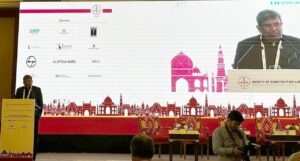
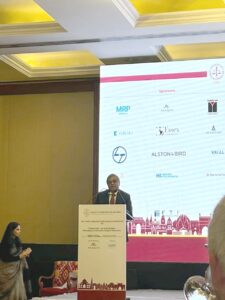
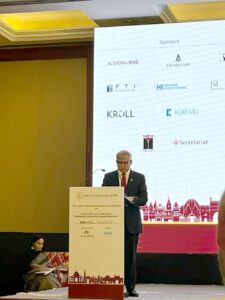
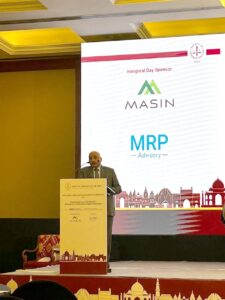
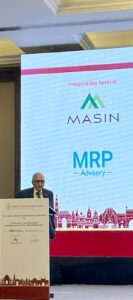
Alexander Nissen KC (UK), Judge TCC, talked about facets of construction law. Mr Nissen discussed the case of Federal Republic of Nigeria v Process and Industrial Developments Limited in detail.
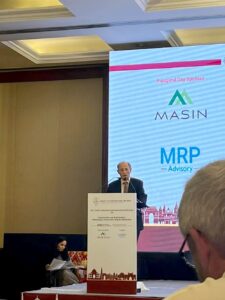
Mr Nissen also talked about AI and human intelligence. Mr Nissen expressed that “I would be alarmed if any substantive judicial or arbitral process is influenced by or dependent on artificial intelligence”.
9th December, 2023
Session 2: Delay liability in Construction Arbitration
Dr. Hamish Lal, Partner at Akin Gump Strauss Hauer & Feld LLP, UK expressed his inability to join the session and requested Mr. Ratan Singh to say a few words on his behalf.
Mr. Mohit Saraf, Founder and Managing Partner at Saraf and Partners, while moderating the event, hinted towards the opportunities in front of us, for India being 4 Trillion Economy.
“In the next 10 years, India will effortlessly move towards being a 10 Trillion Economy. Adding 6 Dollars in 10 years, we need concurrent investment. 60-65% of the money really goes towards Construction. We are expecting almost 6 times Construction Contracts in next 10 years, so will be the disputes and the complexity.”
He added that “we have to build capacity to deliver in a faster method, and that there were a lot of issues, and it is more important to understand the opportunity and be efficient enough. We cannot come in the way and stop growth for investment”.
Mr. Saraf commented that “For the first level of dispute to get resolved in India and Singapore, the difference of days is huge, and the expense eventually goes up.”
Construction Contracts have notice requirements. Mr. Gurmeet highlighted the various important aspects in a notice to resolve the claims quickly. He also threw some light upon FIDIC Sub-Clause 20.1. Mr. Gurmeet further explained the trends around the globe when it comes to Construction disputes and their resolution.
He further cited cases Obrascon v. HM Attorney General for Gibraltar (2014) where it was said that “Although a contractor may give notice in apprehension of delay unless actual delay in a project is recorded.”
From Indian perspective, Mr. Saraf pin pointed Section 28 of the Indian Contract Act. Another important question was good faith, reasonableness, and that’s moving towards stricter interpretation. There’s no exit from a contract except frustration – only illegality or impossibility. However, Courts in India are mostly dealing with arguments based on reasonableness. He also discussed Nabha case for implied terms of contract and the penta test.
Mr Kirindeep Singh cited the commentaries in cases like Hudson’s and Keating, Diamond Glass Enterprise and also talked about Crescendas Bionics case where it was said that “When you’ve a claim for loss of chance to earn rental v. Loss of rental, loss of chance comes before the actual loss of rental. ” It was also noted that very often, the general damages are not easy to prove. Mr Singh further discussed the interaction between Liquidated Damages and General Damages.
Mr Puneet Gupta said that “the delay liability which is already mentioned in the contract, then where does the confusion arise?”
He narrated a factual scenario for the Contractor seeking extension of time. The arbitrator has to decide whether the contractor was entitled to extension of time and prolongation costs, and whether the employer was entitled to impose liquidated damages?
He further explained true concurrency based on the Contractor’s approach through the SCL Protocol, Henry Boot Construction v. Malmaison, the Prevention Principle. Then comes the Employer’s objection based on: No prevention along with But-for-Test. As opined by Mr. Puneet, the best way to move forwards is by defining the true Concurrency. He also threw some light on Concurrent Effect of Sequential Delays as per the SCL Protocol.
Mr Dhirendra Negi discussed the period of employer’s liability vide FIDIC Clause 20.1, followed by extended stay costs and causation. Also illuminated on what additional cost is as often claimed by the contractors, and why the same needs to be more clear. He also discussed a case study on delay in contract for Design and Construction of Civil, Building and Track works.
Mr. Ratan K. Singh concluded the session to say a few words on behalf of Dr. Hamish. He said “Session is concerned with delay liability, one must first question the aspect what constitutes a delay? The notion of delay needs some commercial analysis. Not all the delay is done by the contractor, and contractor culpable delay needs to be considered”.
He also quoted that “The task of Expert is incredibly difficult, since he/she hasn’t lived the project but often asked to write reports giving detailed analysis on the cause of delay. “
Session 3 :Heads of delay claims and quantification
Mr Gourab Banerjee said that “the Large scale construction disputes end up with arbitration rather than the Courts. Our pool and panel of arbitrators is quite varied, mostly appointing retired judges. We also have technical arbitrators. In the topic we are discussing here, there are major issues that we deal with on a daily basis”. He also said that “the various heads of delay claims include direct labour costs, management, there are problems of proofs. Either leave it to quantum experts and they state the lack of documents – the simple problem of maintaining records”. He also discussed Unibros by Justice Dipankar Datta and the recent Batliboi’s judgment by Justice Sanjiv Khanna.
Mr Garth McComb talked about the Contractors tend to be quite creative with their claims. He also said that “Delay claims depend upon particular contract terms which may be : Contract rates and prices, specified delay cost rate, loss and expense”.He further discussed the problem with hired plants and equipment – delays enhance costs. In case of owned plant and equipment, such issue of rents may not arise, but maintenance etc. may be there.
Moderator Mr Dinesh Pardesani said that “there has to be a believable story to be put before the arbitrator, supported by documents of progress, or it becomes very hard to prove claims”.
Mr Sundra Rajoo focussed on Condition Precedent and Head Office Overheads. He also said that “earlier, there was no such thing as condition precedent. The Construction Team then kept things to go in a particular way, and there were not much claims and there was no condition precedent. It only started to be seen in 1996 when the lawyers came into the Industry trying to understand construction and it took a life of it’s own and got a new direction”. He further said that “Condition precedent is all about notification. An issue will usually arise when a contractor is not able to comply with a condition precedent to an extension of tune and the employer has caused the delay”.
Mr Richard Bailey speaking on Delay Analysis Techniques from a lawyer’s eyes. He discussed Actual cost v. Formula Calculations through Tate and Lyle v. GLC (1982) and delay Analysis v. As-built information and mentioned Great Delay Analysis debate. The world of major construction is clearly moving away from ad-hoc programmes to extensive management of the construction process.
Naoki Iguchi discussed how the Civil Law Courts treat ‘disruption and acceleration’ with Japan’s example which succeeded the civil law systems in 1880s which still governs most of contractual issues. He also said that “Literal rule of interpretation is not almighty, ‘Contextual Interpretation’ is allowed and frequently used, but generally, there are no time-bar provisions in contracts.”
Session 4: Role of Experts in Construction Arbitration
On the question of how the experts witness comes into play, Sean S Gibbs, Managing Director Hanscomb Intercontinental, said that “an expert is to assist or advise the tribunal”. He explained some of the accreditations which expert must hold.
He explained that the principle duties and responsibilities of an expert witness have been summarised by Mr. Justice Cresswell in National Justice Compania Naviera SA v. Prudential Assurance Company Limited (also known as the “larian Reefer” case). He stresses that it is important that an expert does not play role of an advocate. He said that expert witness should state their opinion based on the facts. He calls part-appointed experts as ‘hired guns’ who are independent.
Mohan Pillay Founding Partner Pinsent Masons MPillay LLP, gave the Tribunal’s view to the role of experts in Construction Arbitration. He gives 4 key qualities that Tribunals look for in the Expert Evidence-
1. Expert Discipline
2. How dense the expert’s report is. Tribunal seeks how lucid the report is.
3. Right input at the right time when issue is being decided.
4. Must be able to explain how the experts have arrived at their conclusion.
Tribunals stress to ensure that whether a particular matter requires a expert and whether the appointed expert in the discipline can actually address the issue.
Geetu Singh, KPMG Partner, Forensic and Dispute Advisory said that “we must look for expert evidence which are reliable, appropriate, accurate, authentic and an evidence which is complete. There are times when the expert evidence come out to be very inadequate. When it comes to construction dispute, it is important to identify the skill set that expert holds”.
She further says that “A quantity surveyor, accountant, cost engineering or cost management expertise are some of the right experts required for construction disputes. It is extremely heavy on the stats and data when you go for construction arbitration. So, it is important that right tools are utilised and hence, an expert with all the technical and technological knowledge can utilise these tools efficiently.”
Mrinal Jain, Managing Director, Secretariat talked about what role can economic and damages expert play. He said that “we have seen an increasing trend in appointment of economic and Damages expert. It is for us to see that how we can assist the arbitrators in this role. Often the matter is so complex that the conclusion of damages, liability and payments is tough to bring about”.
On interplay between delay and damages expert, Mrinal said that “it depends on the modelling and what the parties have agreed on. If the profit is delayed, the worth of the money is lower in future”.
Session 5: Liquidated Damages – Comparative Position
Vivek Kapoor, Barrister and Arbitrator, 39 Essex Chambers said that “great difference between the Indian and English law test for liquidated damages is that The English law test focuses on commercial reality. In the Indian context, the reasonableness plays an important role”.
Mr. Roberto Panetta, Founder and Managing Partner, Panetta Law firm, Italy talked about Italian insights on the topic. He said that “the purpose of liquidated damages is to provide certainty and predictability to the contracting parties. By agreeing to a fixed amount of damages in the event of a breach, the parties can avoid the uncertainty and expense of litigation to determine the actual damages suffered. Liquidated damages also provide an incentive for the breaching party to perform their obligations under the contract and to complete the project on time”.
He added that under the Italian Law, parties can exercise their contractual autonomy by providing the contract with a specific clause establishing the compensation of any further damage as per article 1382 para 2 of the Italian Civil Code.
Richard Harding, Barrister, Keating Chambers talked about an understanding of the construction disputes arbitration in the Saudi Arabia. He emphasised the importance of understanding Arabic in order to have a clarity of the laws and complex legal terms. As per him the new Saudi civil law provides that if an employer does not agree with the decided liquidates damages amount in the contract, the employer can get away with it if there is a serious defect or fault by the other party/ contractor. So, the burden is on the employer to show that the liquidates damages amount shall be reduced in such cases of fault. However, the Court or arbitrator have the right to decide the amount.
Mr Ganesh Chandra Kabi, gave the position of liquidated damages in India. He said that “ there is no express provision for liquidated damages in Indian regime. It is ‘reasonable compensation’ under Section 74 of the Contract Act, 1872. There were various case laws which interpreted the term in light of arbitration such as the BSNL v. Reliance Communications Ltd., (2011) I SCC 394; ONGC Ltd. vs Saw Pipes Ltd., (2003) 5 SCC 7O5; Kailash Nath Associates vs DDA, (2015) 4 SCC 136”. He said that “if the extension of time is given without liquidated damages, the same cannot be imposed in future”.
He also talked about why should employer have liquidated damages (LD) clause. He said that “the Complexity & difficulty in upholding LD defeats the commercial purpose & utility of the LD clause. The LD clause limits the amount of claim of damages. However, the LD clause enables Employer to adjust money without adjudication and Secure the amount in case of dispute”.
10th December, 2023
Session 6: Variations in Construction Projects
Jafar Alam, Partner Trilegal India moderated the session.
Rajdeep Choudhary, Partner , Archeus Law India, gave a helicopter view of the basic provisions of variations. On what is variation, he said that “globally variation is identified as the reason for disputes.”
He added that “Claims of variations can be defeated if the employer does not know about the variations. If engineer confirms the variations, it is binding on the contractor.”
He further said, “ occasionally ,there is a position in contracts where the contractor can directly submit the proposal to the employer.”
On descoping he said that “when it happens, contractors cry foul.”
On appointment of experts , he said that “I wish to see an uptake on how we use the experts.”
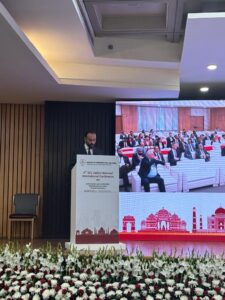
Anand Juddo, Head of Practice , Juddo Arbitration Chambers , citing a Supreme Court Judgment, wherein it was observed that oral agreements can give rise to disputes, said that “ under the civil law we have Article 1793 of the french civil code, it ensures that the employer is not taken by surprise.”
He further said that “ if you need mediation, you need people in the trade, you need people who understand the technicalities.”
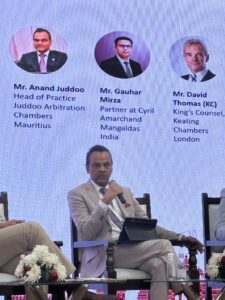
Gauhar Mirza, Partner, CAM said that “deviations also form part of variations. While preparing a claim we need to see whether it is a deviation or a variation.”
He said that “If party actually thinks something can be resolved without lawyers, then mediation is the way to go.”
He talked about incentives clauses for the contractors, he said “there are incentives for the contractors if they complete the project on time.
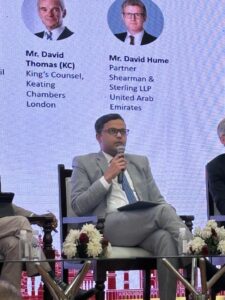
David Thomas, King’s Counsel, Keating Chambers , London , said that “ change is the biggest driver of construction contracts.”
He further said that “You get hundreds of variations, some of them are of high value and some of them are of low value.”
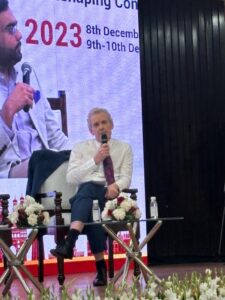
David Hume, Partner Shearman & sterling LLP, UAE, said that “the contractor should not sit on his rights.”
On how to frame a notice, he suggested that “ make sure it is fully documented.”He discussed
things to bear in mind while framing notice.
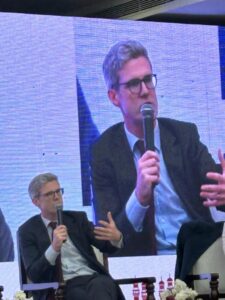
Session 7: Advocacy in Construction Arbitration
Shashank Garg, Founder Chambers of Shashank Garg moderated the session.
On the need for witnesses in construction arbitration , Apoorva Patel, Counsel Alston & Bird, New York, USA , said that “just because construction arbitration is document heavy, that does not mean there is no need of witnesses”.
He added that “Witness preparation is important to make the witness familiar with the examinations. An unprepared witness can be came across as unreliable.”
On virtual hearings, he said that “ from an advocacy perspective, the zoom fatigue is real”. You cannot see whats behind the camera, whether the witnesses are testifying from their home , or whether someone is giving them cues, or they are reading from camera etc.”
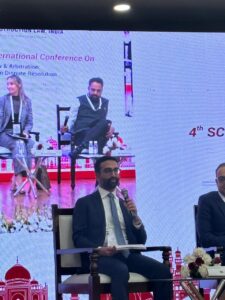
On the lawyer’s role of choosing the witness, Mayank Mishra, Partner, Indus Law India, said that “ witness competency to dispose matters”.
He said that “experts contractual adjudication requires establishing court objective facts. The expert opinion must give way”. Ondrawing linkages , he said “the fact witness should prevail.”
On making a heavy arbitration efficient , he suggested memorial approach. He said that “ we should make the case around the evidence”.
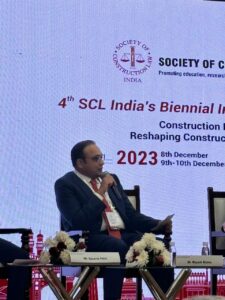
On how construction law is specialised, Genevieve Poirier, Partner LALIVE London, said that “the choice of a panel in construction arbitration is no different than any other arbitration”.
On appointment of experts, she said that “ one should look at where their expertise has been gained, how recent is their expertise. Once you get to arbitration we are no longer in mediation and conciliation thus, we need to have a panel comprised of primarily lawyers.”
She also talked about the most damaging expert evidence.
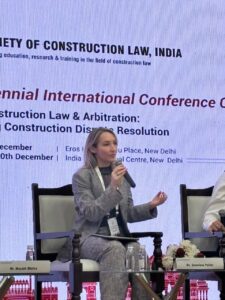
On how construction arbitration is different, Tejas Karia, Partner & Head Arbitration, SAM, said that so many technical aspects are involved.
On jurisdictions of the Tribunal, he said that “in terms of quantum and liability, we have seen that it is a mixed approach. If its complex and quantification will take time then its effective to split it.” In his view bifurcation is more efficient, its depends on who the arbitrators are, the timelines etc.
On documentary evidence, he said “in construction arbitration we have a strong documentation from the start. One must be very careful in documentation.” He further added that in construction arbitration oral evidence has less value, and heavy reliances is placed on documents. Discovery must be done prior to the pleading stage. He remarked that “Sometimes the success lies in asking for the right documents from the other side.”
He suggested that for a successful construction arbitration, written advocacy has a great impact.
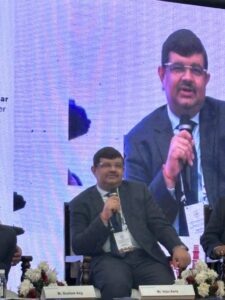
On choice of an ideal tribunal, Manoj Kumar, Founding Partner, Hammurabi & Solomon Partners, said that the element of technical expertise is very important. Complete judicial panel is not recommended. The ideal combination is the presence of both technical and judicial experts.”
On effectiveness of virtual hearings in arbitration, he said that “the virtual hearings are a reality, when it comes to arbitration, the award that comes out finally must be an enforceable award. The procedural trappings on the rights of the parties , virtual hearing can be built is place.”
He added that advantages of a in-person cross examination , will compel me to insist upon in-person hearing.
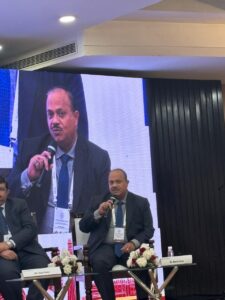
Session 8: Linear projects and its peculiarities
Vyapak Desai, Head-International Litigation & Dispute Resolution Practice, Nishith Desai Associates moderated the session.
Talking about linear projects and its peculiarities , R. Venkataraghavan, Professor of Practice , Manipal Law School, Bengaluru, discussed about vertical and horizontal linear project challenges.
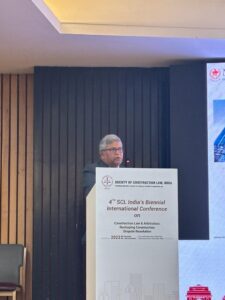
After looking at the charts he quoted “paralysis by analysis” . He further said that “transparency is the main key to manage projects efficiently”
Ananya Kumar, J. Sagar Associates, said that most of the arbitration we see is delayed because of the cost.
He emphasised that experts are important as they can overcome the mess that is created in linear projects.
He also talked about the principle of concurrency.
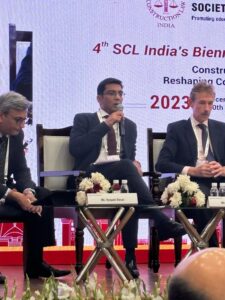
Ajit Kumar Mishra, General Manager, DFCCIL, said that “a linear project from an employer’s perspective is very complex. Each stakeholder has a different perspective. These are the real life issues.”
He further said that “in linear projects not all activities are affected by the linearity”.
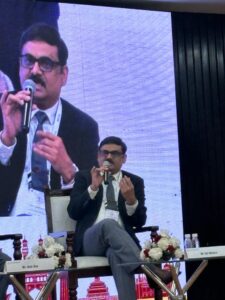
Jon Prudhoe, Senior Managing Director, Ankura, Singapore talked about issues surrounding acquisition of land.
He further talked about sequence changes in linear projects and the alternative progress management.
He said that “delay can be measured by comparing planned to actual cumulative progress.”
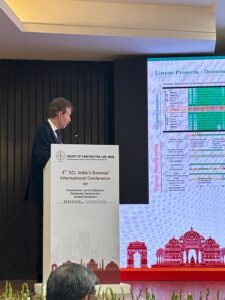
Talking about delays Alok Das, Director, Expert Services – Construction Disputes
Kroll India , he said that delays occur because one needs to take additional approvals. He cited few examples.
Discussing on how experts can assist in planning and managing linear projects, he displayed a linear scheduling method and line of balance through a chart.
He further talked about linear planning and scheduling techniques. He discussed the difference between linear scheduling techniques and critical path method.
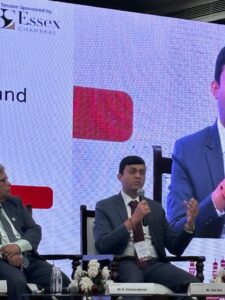
Vasudev Bhagavatula, Director, Accuracy said that “ delays are contractor driven.” he further said that “there needs to be a clarity on what concurrency is.”
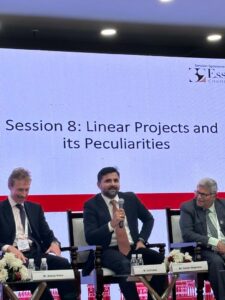
Session 9: Mediation, DABs and Courts as alternative forums to Arbitration
On role of judges in ADR, Justice Gita Mittal, Former Chief Justice of High Court of J&K and Ladakh, India , said that “ we have court annexed mediation centres. It includes judges. The role of the judge is very significant not just only in drafting the referral order, but also in preparing the party. The judge instills confidence in the parties about ADR.Judges remove the credibility deficient in ADR.”
She further said that “as a mediator, one needs to go through a 40 hours of training. There is no forum that recognises the mediators. There is no transparency yet.”
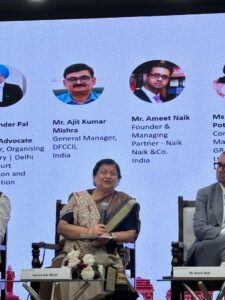
JP Singh, Senior Advocate , Founder , Organising Secretary, Delhi High Court Mediation and Conciliation, said that mediation what we practice is a facilitated mediation. A mediator helps parties to design party their own form of settlement.
He remarked that Mediation should not be called a ADR , Mediation is a complimenting solution.
He added that effectiveness of any institution comes from the people who man that institution.
He said that Mediation is to advise parties for doing reality testing, when the disputes have arisen.
He further stated that when it comes to how these institutions will work, in India the main problem is the drafting of the ADR clause. One should draft a clause that has the multi tiered dispute resolution processes.
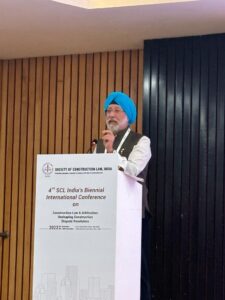
Contrasting between arbitration and mediation Ameet Naik, Founder and Managing Partner, Naik Naik & Co. cited three pillars of a successful mediation- mindset , culture, and infrastructure.
He said that arbitration is proving to be more successful in India. Mediation needs to catch pace with arbitration.
He suggested that there is need of institutional legitimacy.
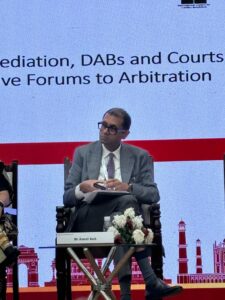
Ajit Kumar Mishra, General Manager, DFCCIL pointed out that “I have not seen any contract that have mediation as a dispute resolution step ,even after the Mediation Act came out.”
He discussed about 4 pre litigation stages.

On contractors perspective on Dispute Adjudication Board , Mohana Potdukhe , Contracts Manager,GR InfraProjects Ltd. India, said that mediation , DABs are contractual in nature , and have critical dependency on the parties.
She discussed salient features of DAB in India.
She also mentioned the reasons of failure of DAB in India:
- Delayed appointment of members
- DAB timelines are never respected.
- Insufficient reasoning
- Lack of forward thinking
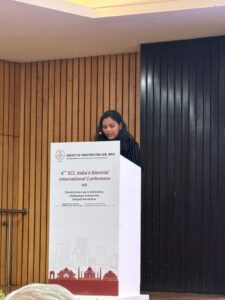
Iram Majid, Executive Director, IIAM pointed out that the users quickly get dispute resolution.
She also highlighted the role of institutions. she said that the institution build the ecosystem.
She emphasised on the need of having more institutions.
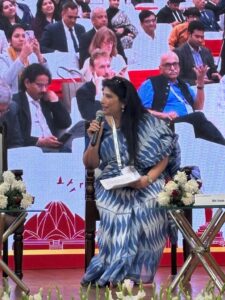


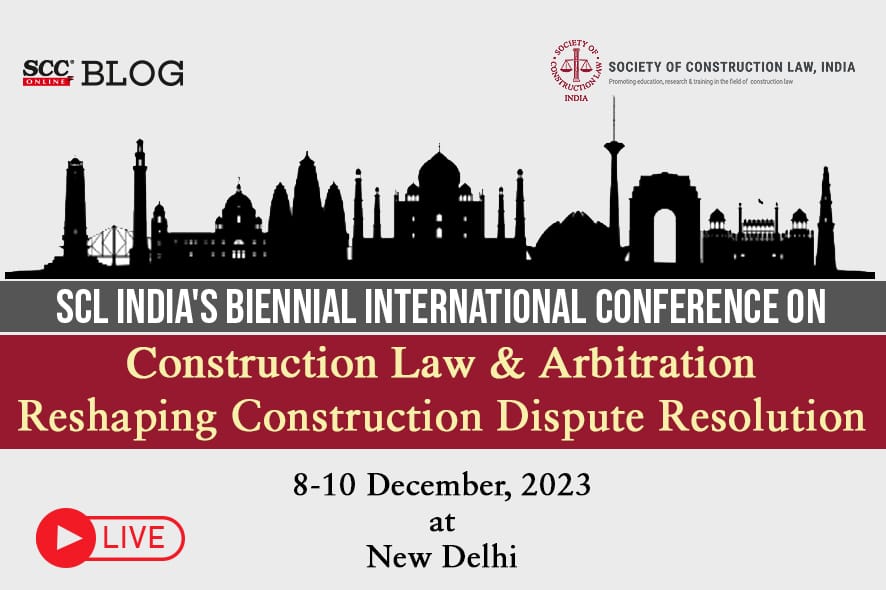




Kudos to SCC Online for live broadcasting the biennial International Construction Law and Arbitration Conference! Your insightful blog captures the essence of this important event and will give us Keeping you informed and engaged. Great cover!